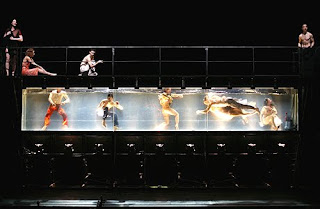Thursday, August 26, 2010
purcell sing-along
As I'm waiting for Kendall to finish a working draft of the opera, I thought I should do some research and brush up on my English text setting.
This may seem easy, but it isn't for me; I know I have had some problems with scansion in the past. My solution for this is to study Henry Purcell's vocal works, which, according to my former professor, is best the way to learn how to set English.
I also figure the most ideal way to study these works is to - get this - SING through them. Of course, this little experiment of mine might have some consequences; mainly, that you the listener might turn red and laugh hysterically if you were to hear my singing. (Has this happened to me before? Ask Andrew Norman, who kindly accompanied me during a semester of voice lessons. My voice teacher made me speak like Mickey Mouse; he turned red, said he had to instantly excuse himself, then ran out and told all my friends how silly I sounded. Thanks, Andrew, you have scarred me for life.)
My next few blog posts will be spent discussing my attempts to sing through these vocal works. In the meantime, you can listen to Ligeti singing Purcell.
Monday, August 23, 2010
In the beginning..,
...there was an allegory.
My original short story, "Building a Better Joshua," was written at a time when mega-churches were beginning to propagate, and was intended as an allegory about religions being ever more vain clones of the last model. The title character is named after the Hebrew character Joshua, which translates as "God is salvation," and not after anything you'll find in Greek or Roman mythology. That said, the story itself is based somewhat (okay, loosely, very loosely) on Ovid's version of the Narcissus myth, with other characters representing Juno (Dr. June Liri), Echo (Chloe) and Nemesis (Dr. X (Name Redacted)). Obviously you can see that their names fall more in line with their Roman counterparts.
The main plot of the story revolves around romance writer Chloe's attempt to use what's in the future referred to as a cosmetic cloning procedure to make a better husband for herself, as old Joshua's just not cutting it for a woman of her stature anymore. The conflict arises when after meeting his clone, old Joshua doesn't slink off as most inferior originals do, but instead seems to become infatuated with the new, better version of himself. What's worse, for Chloe at least, the clone doesn't seem entirely put off by this attraction.
I'm not going to give a whole lot of the plot away from there yet, but you can rightfully guess that hijinks will ensue.
Narcissus and Echo aren't the only myths influencing the story, and while they haven't been used as often in contemporary culture as they should be, the other myth I heavily borrowed from, that of Pygmalion and the statue, represented in Dr. Liri's interaction with her clone creation, has crossed well into the land of Trite. If I didn't feel that I was keeping that aspect of the story original and putting a different spin on it than say Mary Shelley (or her many many derivatives,) George Bernard Shaw or Richard Powers to name a few, then I might have thought twice about including it. However, I'm vain. I do think I have something new here.
Next week, I'll write about some of the challenges translating this story into a more poetic form, and one case where it's actually been made easier than when writing the original.
Subscribe to:
Posts (Atom)

